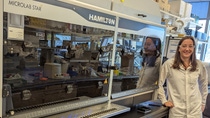Media
Enzymes, a powerful yet silent ally of sustainability
Melissa Scranton, Ph.D., and her team at the BASF research and development lab in San Diego are working towards more sustainable products. Who are their allies in doing so? Enzymes.

Melissa Scranton at BASF's Enzyme Lab in San Diego, California.
Sustainability has become a major focus for consumers in the past few years. People want to know what is in their products and how sustainable the ingredients are. For this reason, more and more companies are looking to nature to find sustainable solutions that can also improve efficiency in everyday products, all while reducing the carbon footprint.
BASF has long been working with enzymes and today, one of the scientists leading the way in enzyme research and strain development is Melissa Scranton, Ph.D. Working out of BASF’s lab in San Diego, Scranton currently leads one of the teams of scientists developing strains and discovering enzymes for applications for different markets from animal nutrition to cleaning products. The team is part of a large effort to address challenging industrial problems with solutions derived from nature.
How it all started
Despite initially wanting to become an animal behaviorist, Scranton began her college years knowing only that she “still remained passionate about the fundamental nature of science to investigate how and why natural events occur.”
After several years in academia, she joined BASF as a researcher, which allowed her, in her words, “to investigate how and why nature behaves the way it does, but with a focus and a purpose for the future.”
Behind the scenes: enzyme applications in everyday products
Enzymes, Scranton explains, are proteins that cause or accelerate chemical reactions, helping to break down molecules or join them together. “In every organism, enzymes have a function for the cell, they are made for a specific purpose. And now, we’re trying to take advantage of that natural evolution to perform efficient chemical reactions in industrial applications.”
Enzymes provide a natural alternative to chemical compounds and have multiple applications, including household products. BASF Enzymes in particular focuses on animal nutrition and detergents. Enzymes have been present in detergents for a while now as a major contributor to improve the sustainability of detergents and the wash process by enabling efficient stain removal at lower wash temperatures. At BASF we can drive sustainability of laundry further by improving enzymes as directly in combination with future, sustainable laundry formulations. Enzymes can also help an animal absorb more nutrients and use feed more effectively.
There is no magical combination. You have to test lots of different combinations to see the ones that are going to work.
Nowadays, Scranton works mostly in key technology development, specifically in strain engineering. Essentially, once a new enzyme is discovered, her team develops specific strains and tools to make sure it will be able to reach its highest expression and perform in the best way it can. They try to enhance “any part of the cell that's helping produce or fold the protein or to knock out things that are degrading our proteins of interest”, she explains.
Additionally, the team is also working with the Care Chemicals division, trying to look for enzymes in a new space. This requires constant communication “to see what their needs are and what the application should look like because you only get what you screen for. We need to make sure that we're screening potential candidates and developing products that will be useful for the team today and the customers in the future,” she explains.
The struggles that come with every new enzyme
Enzymes can pose several substantial challenges. Undoubtedly, the biggest one is developing an enzyme that is just right, able to thrive in the specific host and environment in which you want it. In Scranton’s words, “there is no magical combination. You have to test lots of different combinations to see the ones that are going to work.”
Making sure the enzymes can survive in a harsh environment and achieve high levels of activity is a challenge in itself, but additionally, scientists need to ensure that the product is economically viable, offering a real benefit to customers. As Dr. Scranton explains, “this challenge requires the interaction of a lot of different teams from biology to fermentation, engineering... And we have application scientists that really work closely with the customers to put it all together, to make sure there is a benefit at the end.” Because of this, it can take several years for a new enzyme product to hit the market.
Finding new and creative solutions in such a specific field as Scranton’s can also present a significant roadblock. This is where collaboration really is key. “My creativity usually comes from talking with people. The more you talk and get different perspectives, the more you can come up with different solutions. Simply thinking about molecular biology and cell physiology and trying to understand as much as we can, that's where we find creative spaces,” she remarks.
Working towards a more sustainable reality
Sustainability is obviously a very big part of Scranton’s job, but it’s also something that she is interested in at a more personal level. “I think even more so now, as a mother, I think about sustainability not only for our generation but for the generations to come. Are we living in a way that is sustainable? I think many people would agree that the answer is probably no. Our rate of consumption and reliance on fossil fuels is not likely going to carry us through my children's generation,” she explains.
“There is renewed energy towards everything being bio-based and biodegradable. I can only imagine that enzymes are going to be a significant (or major) contributor to more sustainable solutions. I hope that we can help steer others in this direction and be part of that growth.”
More information
For questions, please contact mariana.licio@basf.com.
For media inquiries, please contact molly.birman@basf.com